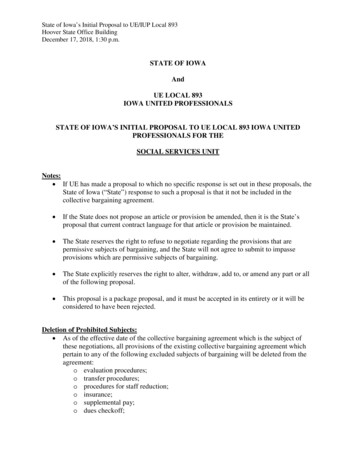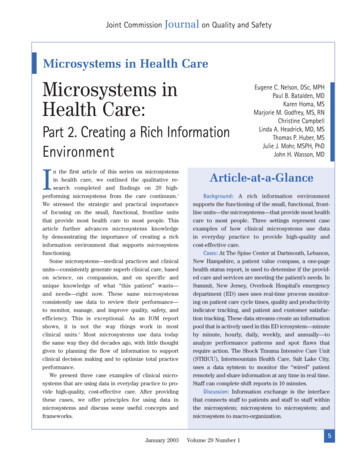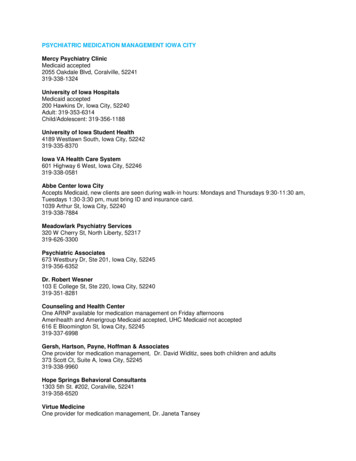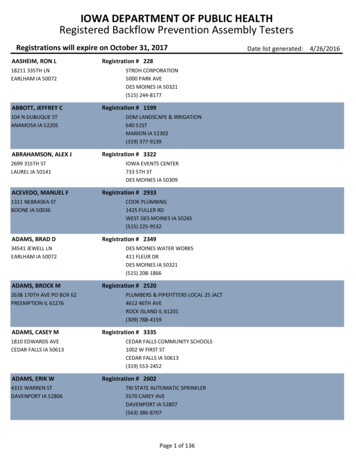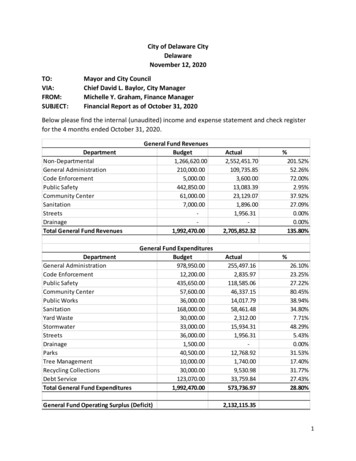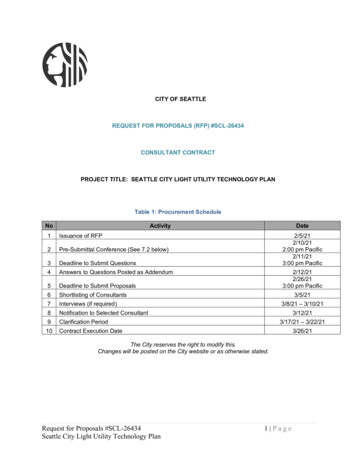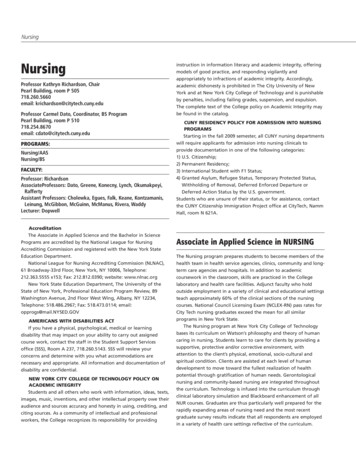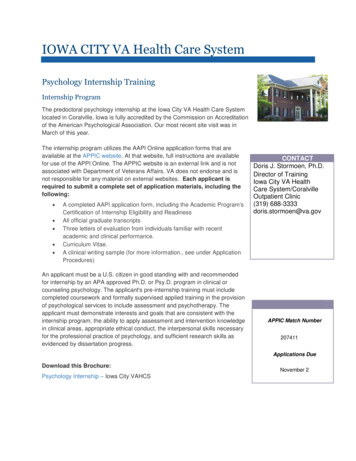
Transcription
IOWA CITY VA Health Care SystemPsychology Internship TrainingInternship ProgramThe predoctoral psychology internship at the Iowa City VA Health Care Systemlocated in Coralville, Iowa is fully accredited by the Commission on Accreditationof the American Psychological Association. Our most recent site visit was inMarch of this year.The internship program utilizes the AAPI Online application forms that areavailable at the APPIC website. At that website, full instructions are availablefor use of the APPI Online. The APPIC website is an external link and is notassociated with Department of Veterans Affairs. VA does not endorse and isnot responsible for any material on external websites. Each applicant isrequired to submit a complete set of application materials, including thefollowing: A completed AAPI application form, including the Academic Program'sCertification of Internship Eligibility and ReadinessAll official graduate transcriptsThree letters of evaluation from individuals familiar with recentacademic and clinical performance.Curriculum Vitae.A clinical writing sample (for more information., see under ApplicationProcedures)An applicant must be a U.S. citizen in good standing with and recommendedfor internship by an APA approved Ph.D. or Psy.D. program in clinical orcounseling psychology. The applicant's pre-internship training must includecompleted coursework and formally supervised applied training in the provisionof psychological services to include assessment and psychotherapy. Theapplicant must demonstrate interests and goals that are consistent with theinternship program, the ability to apply assessment and intervention knowledgein clinical areas, appropriate ethical conduct, the interpersonal skills necessaryfor the professional practice of psychology, and sufficient research skills asevidenced by dissertation progress.CONTACTDoris J. Stormoen, Ph.D.Director of TrainingIowa City VA HealthCare System/CoralvilleOutpatient Clinic(319) 688-3333doris.stormoen@va.govAPPIC Match Number207411Applications DueDownload this Brochure:Psychology Internship – Iowa City VAHCSNovember 2
TABLE OF CONTENTSSETTING . 3PROGRAM OVERVIEW . 4ACCREDITATION . 4TRAINING PHILOSOPHY . 4TRAINING GOALS. 5SUPERVISION . 6COMPLETION REQUIREMENTS. 6BENEFITS . 8STRUCTURE . 8MAJOR CLINICAL ROTATIONS . 9ANXIETY/PSYCHOTHERAPY . 9GENERAL MENTAL HEALTH . 11NEUROPSYCHOLOGY (MAJOR) .12PTSD . 13MINOR CLINICAL ROTATIONSACUTE CARE/PRRC .14HEALTH PSYCHOLOGY .15NEUROPSYCHOLOGY (MINOR) . 16POLYTRAUMA . 16SUBSTANCE ABUSE .17RESEARCH. 18STAFF . 19APPLICATION PROCESS . 27CONTACT INFORMATION . 29WEBSITES FOR FURTHER REFERENCE . 30ICVAHCS Psychology Internship Program BrochurePage 2
SettingIowa City Veterans Affairs Health Care System (VAHCS)The Iowa City Veterans Affairs Health Care System (VAHCS) is an affiliated teaching hospitaland research center located in Iowa City, Iowa. This tertiary care Level I facility is classified as a VHALevel 1c medical center that serves a veteran population residing in 33 counties in eastern Iowa, 16counties in western Illinois and one county in northern Missouri. In addition to psychology, specialtyservices include all internal medicine specialties, neurology, dermatology and psychiatry. Inpatient care isprovided with 93 acute care beds (with 15 of these in an acute psychiatric inpatient unit). The IC VAHCSis one of five VA regional kidney transplant centers and in FY13 performed 41 transplants. Extended careand rehabilitation services include home-based primary care, contract community nursing homes,advanced care planning, amputee clinic, spinal cord injury, geriatrics, home telehealth, caregiver support,hospice/palliative care, pain management, and a polytrauma support clinic team. A therapeutic lifestyleclinic has been added, as well. The research program at the Iowa City VAHCS has consistently been oneof the top VA facilities nationwide in terms of VA and non-VA research funding. Psychology andPsychiatry make up the Mental Health Service Line and our outpatient services are housed in theCoralville Clinic that we share with one of the Primary Care outpatient clinics. The clinic in Coralville,which is located 2 miles west of the medical center, has a shuttle van that makes six trips per day to themain facility.The Mental Health Service Line is a large, interdisciplinary service made up ofpsychologists/neuropsychologists, psychiatrists, social workers, Ph.D. and M.S.-level marriage and familytherapists, outpatient substance abuse counselors, a psychometrician, and seven support staff. Inaddition to the Coralville Clinic, which is an extension of the main medical center, there are service lineclinical staff at all nine of our Community-Based Outpatient Clinics (CBOCs), serving our largely ruralveteran population. In addition to the face-to-face outpatient services that we provide, we also frequentlyprovide clinical services utilizing Telehealth technology to our veterans at each of our CBOCs. We nowalso offer Televideo to Home services for ease of access as appropriate.Iowa City/CoralvilleIowa City offers small town charm, big city excitement, and a great quality of life. And that's notjust our opinion. Ask Money Magazine, Sperling's Best Places, USA Today, Forbes Magazine, AARP,Outside Magazine, and National Geographic. These and others consistently rank Iowa City high on suchvariables as best places to live and work, most educated population, best college towns, best places toretire, and most affordable. Why the appeal? Too many reasons to list, but some include a top tier publicuniversity (think sports, arts, libraries, prestigious medical center all across the street from the ICVAHCS, by the way), chic restaurants and shops in a compact, pedestrian-friendly downtown/collegetown, reasonable cost of living, low crime, award-winning public schools, vibrant arts scene, and outdoorICVAHCS Psychology Internship Program BrochurePage 3
recreation within minutes of the center of town. It's all you could want in a compact package: Midwestfriendliness and East Coast amenities. What could be better? For more information, you can go to IowaCity's official website at http://www.icgov.org/default/?id 1359 as well as the following:http://www.iowacity.com/ and http://www.iowacitycoralville.org/index.aspx?NID 107.Program OverviewAccreditationThe Iowa City VA Medical Center has been a training site for graduate students from the University ofIowa's APA-accredited doctoral psychology training programs for many years. The Psychology InternshipProgram at the Iowa City VAHCS has been accredited by the American Psychological Association since2010. Our last site visit was March 19-20, 2015; the reaccreditation decision is pending. The program isalso a member of the Association of Psychology Postdoctoral and Internship Centers (APPIC) and abidesby its policies and procedures.Questions related to the program's accreditation status should be directed to the Commission onAccreditation:Office of Program Consultation and AccreditationAmerican Psychological Association750 1st Street, NEWashington, DC 20002-4242(202) ion/grad/program-accreditation.aspxTraining Philosophy and ModelThe philosophy of our program is based on the practitioner-scholar model, with the primary focus oftraining on direct clinical work. We endorse the view that good clinical practice is based on the science ofpsychology and, likewise, the science of psychology is enhanced by the experience of working with realpatients. In all facets of their training, our interns are expected to apply scholarly inquiry and criticalthinking to their work. And, while research is not required as part of the internship, we encourage ourinterns to learn about evidence-based practice and we expect that they will learn to practice psychology ina manner that is informed by psychological theory and research. Interns are, for example, encouraged toapply scholarly inquiry and critical thinking to all facets of their work, including the application of scientificinquiry to case conceptualizations, the formulation and testing of clinical hypotheses, the critical analysisof cases, and developing thoughtful strategies to address mental health consultations and evaluatingethical dilemmas. At the same time, we acknowledge the complexity of real patients and the limitations ofour empirical base. While implementing scientifically validated treatments, we respect the uniqueness ofindividual patients and base our clinical decisions on a sequence of hypothesis testing.ICVAHCS Psychology Internship Program BrochurePage 4
Our program embraces a generalist training approach and a developmental training model. We believethat interns are best trained by developing their generalist skills across a spectrum of clinical areas. Thisis accomplished through various didactic and professional seminars and deliberate case assignments thatgradually expand interns' repertoire of skills. Interns are encouraged to choose training rotations thatmeet their individual training goals while also allowing them to become more broadly competent.Supervisors will be identified as mentors and role models who are accomplished in the areas of emphasisselected by the interns. Over the course of the year, intern training moves from close supervision andmentoring to more autonomous functioning. The training model for the pre-doctoral training program atthe Iowa City VAHCS, therefore, has three key components: (1) empirically-supported practice, (2) selfguided learning through mentorship, (3) and, broad-based training with increasing depth.Interns are expected to be active participants in shaping their training experiences in a variety of ways.Interns are required to take responsibility for their own learning by identifying individualized training goals,by self-observations, self-evaluation, and participation in continuing education. Interns are also expectedto participate in the development and improvement of the training program itself by providing feedbackand evaluation of supervisors and training experiences.Our training program also places a high value on increasing and/or maintaining an awareness of diversityissues over the course of the training year. We strive to be sensitive to individual differences anddiversity, including recognizing cultural and social factors as they influence a person's experience andworld view. We believe that clinical practice is strengthened by understanding the perspective of othersand responding with sensitivity to individual variations and differences. In addition, it is the goal of ourprogram to attract applicants from culturally and socially diverse backgrounds.Training Goals1. Interns will acquire the requisite knowledge and skills in psychotherapeutic interventions for a minimumof entry-level practice of professional psychology.2. Interns will acquire the requisite knowledge and skills in psychological assessment for a minimum ofentry-level practice of professional psychology.3. Interns will acquire requisite knowledge and respect for cultural and individual diversity for a minimumof entry-level practice of professional psychology.4. Interns will acquire the requisite knowledge and skills in consultation and communication for aminimum of entry-level practice of professional psychology.ICVAHCS Psychology Internship Program BrochurePage 5
5. Interns will acquire the requisite knowledge of and conduct themselves according to professionalethical and legal standards for a minimum of entry-level practice of professional psychology.6. Interns will obtain the requisite knowledge and skill in the strategies of scholarly inquiry and methodsfor a minimum of entry-level practice of professional psychology.7. Interns will develop maturing professional identities as Psychologists.8. Interns will acquire knowledge of theories and/or methods of supervision.SupervisionWe are committed to providing interns with access to multiple supervisors who are actively involved in theintern's training. Supervisors are available regularly to provide guidance and/or direct support with casesbased on the intern's developmental and training needs. Having multiple supervisors concurrently andthroughout the year provides interns with exposure to varied clinical skills and theoretical orientations.Interns receive a minimum of three hours of individual supervision plus a minimum of two hours ofsupervised activities (including group supervision, case conference, group co-facilitation, etc.) per week.At any given time, each intern will have a Major Rotation Supervisor, a Minor Rotation Supervisor, andcontact with the Director of Training. Interns are expected and encouraged to seek additional informalsupervision and consultation as needed in addition to the formal scheduled supervision times. Interns arealso made aware that clinical staff members are available to provide consultation and supervision onspecific issues as the need arises and schedules allow.Our training model is developmental. Interns move from close supervision, mentorship, and intensiveinstruction to relatively autonomous functioning over the course of each clinical rotation. We alsoanticipate that, within each rotation, supervision will be more intensive at the beginning and will becomeless intensive as the intern displays increasing knowledge and competence. Similarly, as the trainingyear progresses, interns are expected to function with increasing autonomy as their skill and competencewarrants and their supervisors deem appropriate.Requirements for CompletionAs the foundation for independent professional practice, and as measured by supervisor evaluations,interns should demonstrate competence in the following areas by the completion of the internship year:Psychotherapeutic InterventionInterns should work effectively with diverse populations, providing appropriate intervention in response toa range of presenting problems and treatment concerns. Interns should demonstrate competentpsychotherapy skills in a variety of modalities (including group and individual).ICVAHCS Psychology Internship Program BrochurePage 6
AssessmentInterns should be able to competently assess patients with a broad variety of problems, utilizing a varietyof evaluation methods (e.g., interviews and psychological inventories). Selection and use of assessmenttools should be appropriate to the clinical needs of the patient and be responsive to the needs of referringprofessionals.Awareness of ethical, legal, and cultural issuesInterns should demonstrate knowledge of ethical and legal principles bearing on psychological practice aswell as an awareness of these principles in their daily practice. Interns should show an awareness of, andsensitivity to, cultural issues that impact patients’ lives and the practice of psychology.Consultation and CommunicationInterns should be able to conceptualize and clearly communicate their assessment strategies, results,opinions, and recommendations to other professionals, in verbal and written form. Clinical documentationshould be timely, responsive to the needs of other professionals, and sensitive to issues of confidentialityand patient respect.Development of professional identityInterns should demonstrate a growing sense of identity as psychologists over the course of the internshipyear. They should show an understanding of the unique contribution and perspective they bring as apsychologist and put this into practice by assuming an increasing level of professional responsibility.Professional judgmentInterns should demonstrate sound professional judgment. In particular, they should be able to accuratelyinterpret clinical information, make sound decisions, and take appropriate action. They should be able torecognize and respond appropriately in cases of severe psychopathology, potential for self-injury, anddangerousness to others.Interpersonal skillsInterns should demonstrate an ability to interact appropriately and professionally with peers, professionalstaff, colleagues from other disciplines, and support staff. Interns should conduct themselves in an ethicalmanner consistent with the guidelines of the profession.Openness to feedbackInterns should be receptive to feedback from supervisors, peers, and other professional colleagues. Theyshould be able to examine feedback objectively and respond with appropriate behavior changes. Internsshould also show the ability to self-monitor and to change their behavior in response to experience.ICVAHCS Psychology Internship Program BrochurePage 7
Awareness of strengths and limitationsInterns should be able to accurately recognize their strengths and limitations. They should practice withintheir capabilities and recognize when to seek supervision, consultation, or training in response to clinicalsituations beyond their capabilities. They should demonstrate a commitment to continued self-educationand to their continued growth as professionals.Stipend and BenefitsFor the internship year 2015-2016, the total stipend will be 23,974; interns are also eligible for federalhealth insurance. State and federal income tax and FICA (Social Security) are withheld from interns'
counseling psychology. The applicant's pre-internship training must include . Ph.D. and M.S.-level marriage and family therapists, outpatient substance abuse counselors, a psychometrician, and seven support staff. In addition to the
